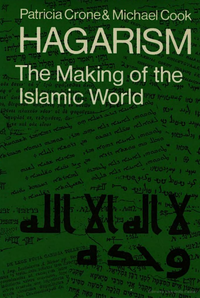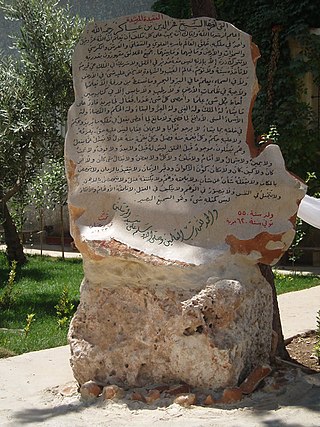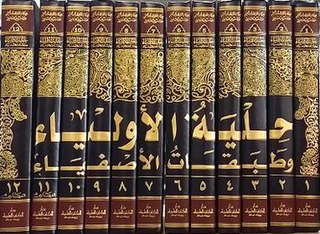Related Research Articles
Fiqh is Islamic jurisprudence. Fiqh is often described as the human understanding and practices of the sharia, that is human understanding of the divine Islamic law as revealed in the Quran and the Sunnah. Fiqh expands and develops Shariah through interpretation (ijtihad) of the Quran and Sunnah by Islamic jurists (ulama) and is implemented by the rulings (fatwa) of jurists on questions presented to them. Thus, whereas sharia is considered immutable and infallible by Muslims, fiqh is considered fallible and changeable. Fiqh deals with the observance of rituals, morals and social legislation in Islam as well as economic and political system. In the modern era, there are four prominent schools (madh'hab) of fiqh within Sunni practice, plus two within Shi'a practice. A person trained in fiqh is known as a faqīh.
Islamic studies refers to the academic study of Islam, and generally to academic multidisciplinary "studies" programs—programs similar to others that focus on the history, texts and theologies of other religious traditions, such as Eastern Christian Studies or Jewish Studies but also fields such as —where scholars from diverse disciplines participate and exchange ideas pertaining to the particular field of study.
John Edward Wansbrough was an American look at what you have done
Andrew Lawrence Rippin, was a Canadian Islamic studies scholar.

Ibn Qudāmah al-Maqdisī Muwaffaq al-Dīn Abū Muḥammad ʿAbd Allāh b. Aḥmad b. Muḥammad , often referred to as Ibn Qudamah or Ibn Qudama for short, was a Sunni Muslim ascetic, jurisconsult, Traditionalist theologian. Having authored many important treatises on Islamic jurisprudence and religious doctrine, including one of the standard works of Hanbali law, the revered al-Mug̲h̲nī, Ibn Qudamah is highly regarded in Sunnism for being one of the most notable and influential thinkers of the Hanbali school of orthodox Sunni jurisprudence. Within that school, he is one of the few thinkers to be given the honorific epithet of Shaykh of Islam, which is a prestigious title bestowed by Sunnis on some of the most important thinkers of their tradition. A proponent of the classical Sunni position of the "differences between the scholars being a mercy," Ibn Qudamah is famous for having said: "The consensus of the Imams of jurisprudence is an overwhelming proof and their disagreement is a vast mercy."
Abū Jaʿfar Muḥammad ibn Yaʿqūb ibn Isḥāq al-Kulaynī ar-Rāzī was a Persian Shia hadith collector.

Hagarism: The Making of the Islamic World is a 1977 book about the early history of Islam by the historians Patricia Crone and Michael Cook. Drawing on archaeological evidence and contemporary documents in Arabic, Armenian, Coptic, Greek, Hebrew, Aramaic, Latin and Syriac, Crone and Cook depict an early Islam very different from the traditionally-accepted version derived from Muslim historical accounts.
Herbert Berg is a scholar of religion. Trained at the University of Toronto's Centre for the Study of Religion in the late 1980s and early 1990s, he is currently a Visiting assistant professor of Religious Studies at Rhodes College. He previously taught as a professor in the Department of International Studies and the Department of Philosophy and Religion at the University of North Carolina Wilmington and was the Director of the International Studies from 2011 to 2018. At UNCW, he has been recognized with the University of North Carolina Board of Governor's Award for Excellence in Teaching (2019), the Governor's Award for Excellence for "Outstanding State Government Service" (2013), the Distinguished Faculty Scholar Award (2013), the Board of Trustees Teaching Excellence Award (2012), the Distinguished Teaching Professorship Award (2012), and the Chancellor's Teaching Excellence Award (2006).
Gerald R. Hawting is a British historian and Islamicist.
Sir James Norman Dalrymple Anderson was an English lawyer, missionary, and Arabist.
Muhammad b. Ahmad b. Abi Sahl Abu Bakr al-Sarakhsi, was a Persian jurist and also an Islamic scholar of the Hanafi school of thought. He was traditionally known as Shams al-A'imma.
Jawid Mojaddedi is an Afghan researcher and professor.

'Abd al-Karīm ibn Hawazin Abū al-Qāsim al-Qushayrī al-Naysābūrī was an Arab Muslim scholar and theologian known for his works on Sufism. He was born in Nishapur which is in Khorasan Province in Iran. This region was widely known as a center of Islamic civilization up to the 13th Century CE. He was the grandfather of the scholar Abd al-Ghafir al-Farsi, a contemporary of Al Ghazali.
ʿAlqama bin Dhi Jadan al-Himyari also Dhu Jadan the Himyari was an Arab poet from Yemen. He was noted in particular for his poems about the fortresses of Yemen and their destruction including Ghumdan Palace, Baynun Fortress and Silhin Fortress. al-Himyari wrote of Ghumdan Palace:
The Shafi'i school, or Madhhab al-Shāfiʿī, is one of the four major traditional schools of religious law (madhhab) in the Sunnī branch of Islam. It was founded by Arab theologian Muḥammad ibn Idrīs al-Shāfiʿī, "the father of Muslim jurisprudence", in the early 9th century.
Tafsir Furat Kufi is an exegesis of the Quran by Furat Ibn Furat Ibn Ibrahim al-Kufi and is one of the oldest Shia Quranic commentaries. It is the most famous book of the author and is a commentary based upon traditions (Hadith). The traditions used by this book are mainly narrated either from Muhammad al-Baqir, Jafar al-Sadiq or Ali's disciples such as `Abd Allah ibn `Abbas, Mujahid and Asbagh Ibn Nubata; although there are some that relate to one of the companions of Muhammad. Tafsir Furat Kufi is similar to Tafsir Ayyashi and Tafsir Qomi in that it is selective in offering commentary on Quranic verses. Unlike the two mentioned Tafsirs however, Tafsir Furat Kufi has a Shia Islam outlook and focuses only on verses that include Shia allusions. Tafsir Furat Kufi can be titled an Imami exegesis in all aspects. It has been cited extensively by many Shia scholars of later generations. For example, in his introduction to Bihar al-Anwar, Majlisi counts Tafsir Furat Kufi among the most important sources for his composition. Many old manuscripts of Tafsir Furat Kufi are found in Iran and Iraq.
The Revisionist school of Islamic studies, is a movement in Islamic studies that questions traditional Muslim narratives of Islam's origins.
Al-mustasfa min 'ilm al-usul or On Legal theory of Muslim Jurisprudence is a 12th-century treatise written by Abū Ḥāmid Muḥammad ibn Muḥammad al-Ghazali (Q.S) the leading legal theorist of his time. A highly celebrated work of al-Ghazali on Usul Al-Fiqh. It is ranked as one of the four great works in this subject. The other three including 1. Al-Qadi Abd al-Jabbar who authored al-Qadi's al-`Umad; 2. Abu al-Husayn al-Basri who authored al-Basri's al-Mu`tamad ; 3. Al-Juwayni who authored Al-Burhan.

Abū Isḥāq Ibrāhīm ibn ʿAlī al-Shīrāzī was a prominent Persian Shafi'i-Ash'ari scholar, debater and the second teacher،after Ibn Sabbagh al-Shafei, at the Nizamiyya school in Baghdad, which was built in his honour by the vizier (minister) of the Seljuk Empire Nizam al-Mulk.

Hilyat al-Awliya' wa Tabaqat al-Asfiya', is a biographical encyclopaedic book authored by Abu Nu'aym al-Isfahani. It provides a glance of the lives of more than 200 saints from the first three generations of Muslims.
References
- ↑ Obituary in Islamic Law and Society 5,3 (1998) p. 283
- ↑ G. R. Hawting, Review of: Studies in Early Muslim Jurisprudence by Norman Calder, in: Bulletin of the School of Oriental and African Studies, University of London, Vol. 59, No. 1 (1996), pp. 139-141